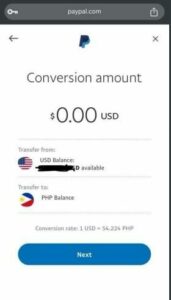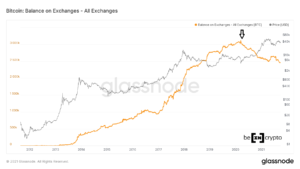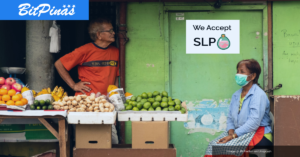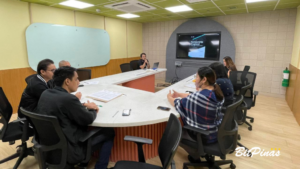Subscribe to our newsletter!
Editing by Nathaniel Cajuday
- After its rollout in 2022, BSP Currency Policy and Integrity Department Director Eloisa Glindro confirmed that the pilot implementation of Project CBDCPh will run until 2024.
- The Central Bank executive also insisted that since the pilot is only for wholesale CBDC, which will involve transfers of large value transactions, it is only limited to a number of participating financial institutions.
- The monetary agency will also use the test-and-learn approach using a sandbox environment, according to the executive.
Almost a year after the Bangko Sentral ng Pilipinas (BSP) announced that they would roll out a pilot Central Bank Digital Currency (CBDC) implementation known as Project CBDCPh, a Central Bank executive emphasized that the pilot test of the said project on selected financial institutions will continue until 2024.
Moreover, during the Central Bank’s 4th Regional Macroeconomic Conference Series virtual event, BSP Currency Policy and Integrity Department Director Eloisa Glindro explained that since the testing will involve transfers of large value transactions, it is limited to a number of participating financial institutions only.
Earlier this year, BSP Governor Felipe Medalla also confirmed that the monetary agency will be continuing its pilot test of CBDC between financial institutions, businesses, and government entities, clarifying that the wholesale aspect of CBDC is mainly restricted to banks and other financial institutions because retail CBDC is intended for the general public.
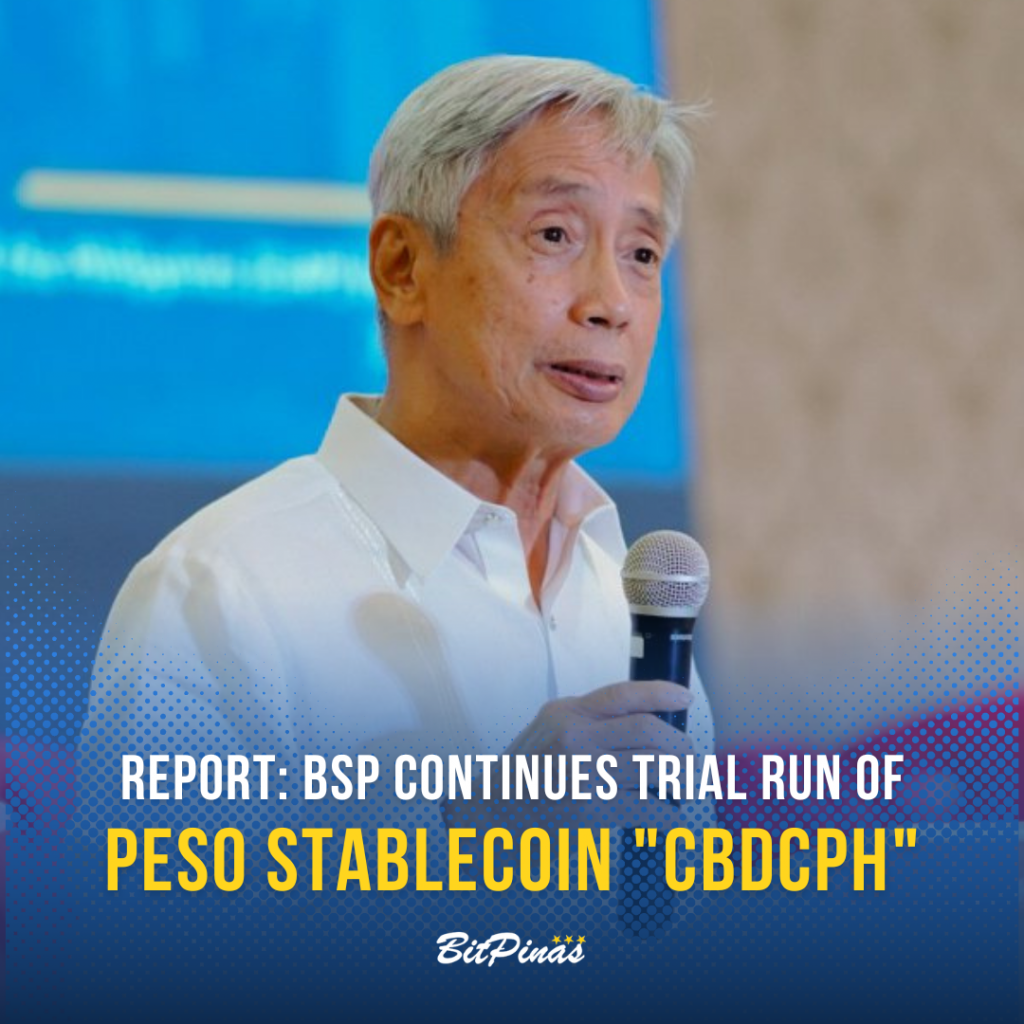
“This project was launched in 2022 and will run until 2024. The coverage of the pilot project is wholesale CBDC, whereby the BSP will use the test and learn approach using a sandbox environment,” Glindro added.
The rollout of Project CBDCPh was first announced by last March 2022 by former BSP Governor Benjamin Diokno, who is now the current Secretary of the Department of Finance
According to Diokno, the venture is in line with the increasing interest of global and regional multilateral institutions such as the International Monetary Fund (IMF), the Bank for International Settlements (BIS), and the Asian Development Bank (ADB), which are also looking into CBDCs.
A CBDC is a digital currency centralized, issued, and regulated by a central bank that can serve as a medium of exchange or store of value. It is basically the digital form of traditional money of a national bank but is different from e-money. Unlike cryptocurrencies, CBDC is regulated by a country’s central bank and governed in terms of supply and value by a country’s monetary policies, trade surpluses, and more.
Then, in April, the BSP announced that it would pursue the pilot project of a wholesale central bank digital currency (CBDC) to promote the stability of the country’s payment system.
The central bank noted that the project covers areas including policy and regulatory considerations, technological infrastructure, governance, and organizational requirements, legal matters, payment and settlement models, reconciliation procedures, and risk management.
“The objectives of this project are very modest. One is to build a necessary capacity within the BSP as well as with supervised financial institutions to have that hands-on knowledge on the functionality, architecture, as well as the operational and organizational requirements for CBDC,” Glindro clarified.
She also highlighted that the project aims to leverage the learnings they will obtain in the pilot project “in defining the roadmap for future pilot projects for other use cases like cross-border payments, intraday liquidity facility, among others, and also equity settlement.”
As per the central bank, the project is led by a management team from multilateral institutions and international standard-setting bodies to ensure coverage of critical operational areas.
However, last October, Diokno countered the project, which was initiated under his term, stating that it “is not yet worthwhile for the Philippines” and “let’s focus on InstaPay and PESONet first before we go to CBDCs.”
Despite this sentiment, the BSP continued to adopt CBDCs in response to the United Nations Economic and Social Commission for Asia and the Pacific’s (UNESCAP) recommendation that nations do so as a means of accelerating economic growth.
Also, Monetary Board Member Eli M. Remolona, Jr. has assured the public that for now, the BSP is still coordinating with other nations and banks in Asia to make cross-border payments more affordable and efficient. The Central Bank also noted that cross-border payment connectivity will support and facilitate international trade, investment, and other economic activities.
Accordingly, the BSP signed a memorandum of understanding (MoU) with other central banks in the Association of Southeast Asian Nations (ASEAN) last November to strengthen collaboration on payment connectivity. The MoU of cooperation in Regional Payment Connectivity was signed during the G20 Leaders’ Summit in Bali, Indonesia—it was signed by the Bank of Indonesia, Bank Negara Malaysia, the Monetary Authority of Singapore, and the Bank of Thailand.
The agreement is set to contribute to accelerating the country’s economic recovery and will promote growth, for it will foster a more inclusive financial ecosystem by enabling fast, seamless, and cheaper cross-border payments across the region.
This article is published on BitPinas: Pilot Test of Wholesale Central Bank Digital Currency in PH ‘Til 2024, BSP Reiterates
Disclaimer: BitPinas articles and its external content are not financial advice. The team serves to deliver independent, unbiased news to provide information for Philippine-crypto and beyond.
- SEO Powered Content & PR Distribution. Get Amplified Today.
- Platoblockchain. Web3 Metaverse Intelligence. Knowledge Amplified. Access Here.
- Source: https://bitpinas.com/regulation/bsp-reiterates-cbdcph-til-2024/
- 2022
- 2024
- a
- accelerating
- According
- across
- activities
- added
- adopt
- advice
- affordable
- After
- agency
- Agreement
- aims
- among
- and
- announced
- approach
- April
- architecture
- areas
- article
- articles
- Asean
- asia
- asian
- Asian Development Bank
- aspect
- Association
- authority
- Bali
- Bangko Sentral ng Pilipinas
- Bangko Sentral ng Pilipinas (BSP)
- Bank
- Bank for International Settlements
- Bank of Thailand
- Banks
- Basically
- because
- before
- Benjamin
- Benjamin Diokno
- between
- Beyond
- bis
- BitPinas
- board
- board member
- BSP
- build
- businesses
- Capacity
- cases
- CBDC
- CBDCs
- central
- Central Bank
- central bank digital currency
- central bank digital currency (CBDC)
- Central Banks
- centralized
- cheaper
- collaboration
- commission
- Conference
- CONFIRMED
- Connectivity
- considerations
- content
- continue
- continued
- continuing
- contribute
- cooperation
- coordinating
- country’s
- coverage
- covers
- critical
- cross-border
- cross-border payments
- cryptocurrencies
- Currency
- Current
- defining
- deliver
- Department
- Development
- Development Bank
- different
- digital
- digital currency
- Director
- during
- e-Money
- Economic
- Economic growth
- economic recovery
- ecosystem
- efficient
- emphasized
- enabling
- ensure
- entities
- Environment
- equity
- Event
- exchange
- executive
- explained
- external
- facilitate
- Facility
- FAST
- Felipe Medalla
- financial
- Financial institutions
- First
- Focus
- form
- Former
- Foster
- from
- functionality
- fund
- future
- G20
- General
- general public
- Global
- Go
- governance
- Government
- Governor
- Growth
- hands-on
- Highlighted
- HTTPS
- IMF
- implementation
- in
- Including
- Inclusive
- increasing
- independent
- Indonesia
- information
- Infrastructure
- Instapay
- institutions
- integrity
- interest
- International
- international monetary fund
- International Monetary Fund (IMF)
- international settlements
- International Trade
- investment
- involve
- Issued
- IT
- knowledge
- known
- large
- Last
- launched
- LEARN
- Led
- Legal
- legal matters
- Leverage
- Limited
- Line
- Liquidity
- looking
- love
- Macroeconomic
- make
- Malaysia
- management
- Management Team
- March
- Matters
- max-width
- means
- medium
- medium of exchange
- member
- Memorandum
- memorandum of understanding
- models
- Monetary
- monetary authority
- Monetary Authority of Singapore
- money
- more
- MOU
- multilateral
- National
- National Bank
- Nations
- necessary
- news
- noted
- November
- number
- objectives
- october
- ONE
- operational
- organizational
- Other
- Others
- participating
- payment
- payment system
- payments
- pilot
- pilot project
- Pilot projects
- plato
- Plato Data Intelligence
- PlatoData
- policies
- policy
- procedures
- project
- projects
- promote
- provide
- public
- published
- Recommendation
- reconciliation
- recovery
- region
- regional
- regulated
- regulatory
- Requirements
- response
- restricted
- retail
- retail CBDC
- Risk
- risk management
- roadmap
- Roll
- Run
- Said
- sandbox
- seamless
- selected
- sentiment
- Series
- serve
- serves
- set
- settlement
- Settlements
- signed
- since
- Singapore
- So
- Social
- some
- Stability
- Still
- store
- store of value
- Strengthen
- such
- Summit
- supply
- support
- system
- team
- technological
- terms
- test
- Testing
- Thailand
- The
- this year
- to
- trade
- traditional
- Transactions
- transfers
- under
- understanding
- United
- united nations
- use
- value
- venture
- Virtual
- which
- WHO
- wholesale
- wholesale CBDC
- will
- within
- worthwhile
- would
- year
- zephyrnet





